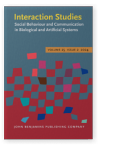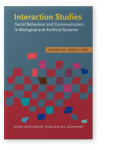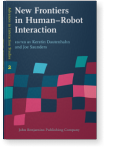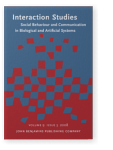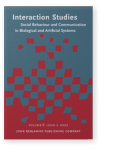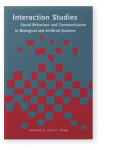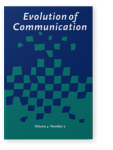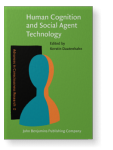Chrystopher L. Nehaniv
List of John Benjamins publications for which Chrystopher L. Nehaniv plays a role.
Book series
Journal
ISSN 1572-0373 | E-ISSN 1572-0381
2021 Impact of nonverbal robot behaviour on human teachers’ perceptions of a learner robot Interaction Studies 22:2, pp. 141–176 | Article
How do we perceive robots practising a task that we have taught them? While learning, human trainees usually provide nonverbal cues that reveal their level of understanding and interest in the task. Similarly, nonverbal social cues of trainee robots that can be interpreted naturally by humans… read more
2011 The acquisition of word semantics by a humanoid robot via interaction with a human tutor New Frontiers in Human–Robot Interaction, Dautenhahn, Kerstin and Joe Saunders (eds.), pp. 211–234 | Article
This chapter describes a HRI case study which demonstrates how a humanoid robot can use simple heuristics to acquire and use vocabulary in the context of being shown a series of shapes presented to it by a human and how the interaction style of the human changes as the robot learns and expresses… read more
2008 Naturally occurring gestures in a human–robot teaching scenario Interaction Studies 9:3, pp. 519–550 | Article
This paper describes our general framework for the investigation of how human gestures can be used to facilitate the interaction and communication between humans and robots. Two studies were carried out to reveal which “naturally occurring” gestures can be observed in a scenario where users had to… read more
2007 Experimental comparisons of observational learning mechanisms for movement imitation in mobile robots Interaction Studies 8:2, pp. 307–335 | Article
Research into robotic social learning, especially that concerned with imitation, often focuses at differing ends of a spectrum from observational learning at one end to following or matched-dependent behaviour at the other. We study the implications and differences that arise when carrying out… read more
2004 Towards robot cultures? Learning to imitate in a robotic arm test-bed with dissimilarly embodied agents Interaction Studies 5:1, pp. 3–44 | Article
The study of imitation and other mechanisms of social learning is an exciting area of research for all those interested in understanding the origin and the nature of animal learning in a social context. Moreover, imitation is an increasingly important research topic in Artificial Intelligence and… read more
2001 The segmentation of speech and its implications for the emergence of language structure Evolution of Communication 4:2, pp. 161–182 | Article
This paper reports a phenomenon supporting the hypothesis that the emergence of structure in the evolution of language was a staged process. To develop a grammatical structure it seems necessary to first have discrete constituents which can be the building blocks of a hierarchical system. By… read more
2000 16. Living with Socially Intelligent Agents: A Cognitive Technology view Human Cognition and Social Agent Technology, Dautenhahn, Kerstin (ed.), pp. 415–426 | Chapter

